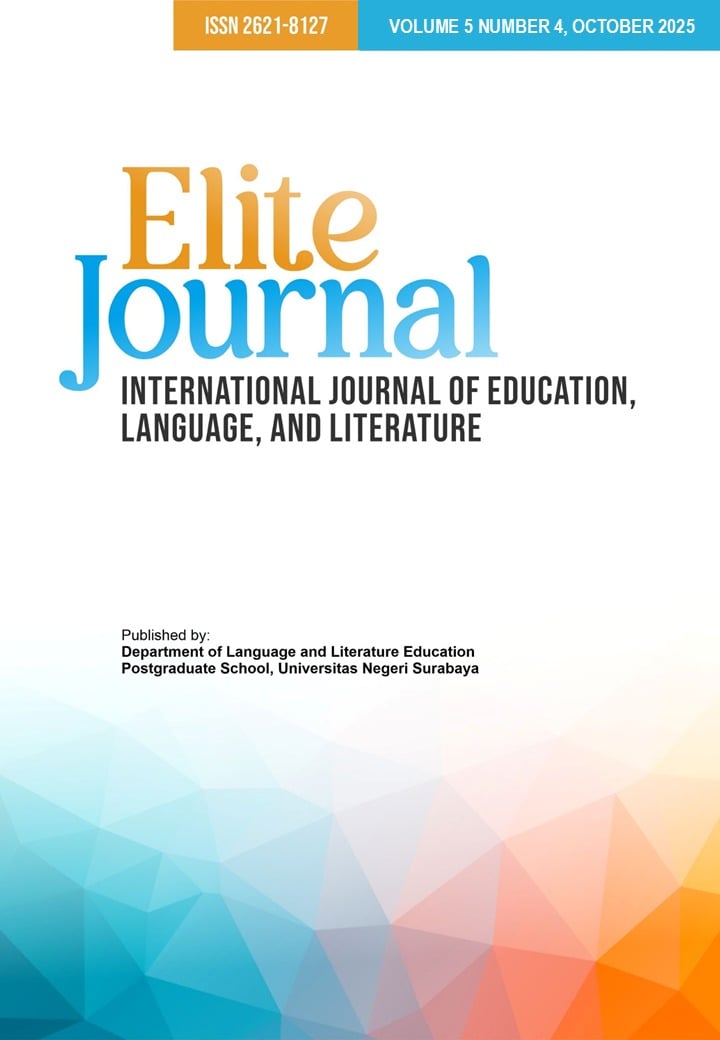POSEY’S VOLUNTARY AND INTENTIONAL BEHAVIORS IN MITCH ALBOM’S FOR ONE MORE DAY
DOI:
https://doi.org/10.26740/elitejournal.v5n4.p48-59Keywords:
Altruism, For One More Day, Mitch Albom, Voluntary and Intentional BehaviorAbstract
This study explores the altruistic qualities of Posey, the main character in Mitch Albom’s novel For One More Day, focusing on her voluntary and intentional behaviors as expressions of altruism. Altruism is defined as selfless concern for the welfare of others, often manifested without expectation of reward. Using qualitative methods and character analysis, this study examines Posey’s acts of sacrifice, emotional support, and moral guidance, specifically in her relationship with her son, Charley Benetto. Her behaviors—from defending her son against unfair judgment to creating lasting emotional bonds—are voluntary and intentional, reflecting a deep commitment to the welfare of others. In conclusion, this study confirms that altruism in the literature can be explained by consistent and intentional actions that prioritize the needs of others over personal gain.
References
Albom, M., (2006). For One More Day. United States: Little Brown.
Batson, C. D. (2011). Altruism in humans. Oxford University Press.
Bhuvana, M. L., Pavithra, M. B., & Suresha, D. S. (2021). Altruism, an attitude of unselfish concern for others–an analytical cross sectional study among the Medical and Engineering students in Bangalore. Journal of Family Medicine and Primary Care, 10(2), 706-711.
Burks, K. J. (2001). Intentional action. Journal of Advanced Nursing, 34(5), 668-675.
Haski‐Leventhal, D. (2009). Altruism and volunteerism: The perceptions of altruism in four disciplines and their impact on the study of volunteerism. Journal for the Theory of Social Behaviour, 39(3), 271-299.
Huppert, F. A. (2009). Psychological well‐being: Evidence regarding its causes and consequences. Applied psychology: health and well‐being, 1(2), 137-164.
Huppert, F. A., & Cooper, C. (Eds.). (2014). Wellbeing: A complete reference guide,
Oktavia, S. A., Pasopati, R. U., Kirana, K. S., Pangestu, I. N. R., & Riza, D. A. (2024). The Substantial Sides of Purity in Honore de Balzac’s Innocence. ELite Journal: International Journal of Education, Language, and Literature, 4(3), 148-157.
Pasopati, R. U., Sasmita, D. R., Santoso, L. S. V., Kurniawati, W. A., & Kartiningsih, R. (2024). The Interpretations of Eternalism in Reality Club’s 2112. Educalitra: English Education, Linguistics, and Literature Journal, 3(2), 69-81.
Rafiuddin, R., Hasana, F. A., Jelita, D. A. R., Hariyono, H., & Pasopati, R. U. (2025, April). How Stereotypes are Formed: The Discontents of Syntagmatic and Paradigmatic Relations in Cultural Models. In Proceeding International Conference on Religion, Science and Education (Vol. 4, pp. 431-442).
Rhoads, S. A., & Marsh, A. A. (2023). Doing good and feeling good: relationships between altruism and well-being for altruists, beneficiaries, and observers. World happiness report, 11(4), 103-130.
Ricard, M. (2015). Altruism: The power of compassion to change yourself and the world. Little and Brown.
Riza, D. A., Margaretha, S., Kurniawati, W. A., Kartiningsih, R., & Pasopati, R. U. (2025, April). Placebo Effect in Matter of Contemporary Self-Reward. In Proceeding International Conference on Religion, Science and Education (Vol. 4, pp. 411-418).
Ruggeri, K., Garcia-Garzon, E., Maguire, Á. et al. Well-being is more than happiness and life satisfaction: a multidimensional analysis of 21 countries. Health Qual Life Outcomes, 18, 192 (2020).
Sharma, N. (2024). The Role Of Altruism In Promoting Psychological Well-Being Among Healthcare Workers: A Review Of The Literature. Educational Administration: Theory and Practice, 30(4), 9048-9059.
Downloads
Published
How to Cite
Issue
Section
License
Copyright (c) 2025 Riska Dewi Ramadhani, Kheista Sasi Kirana, Dewi Syifanaya Firdausy Nurdin, Bagus Pratama Wijayanto, Rommel Utungga Pasopati

This work is licensed under a Creative Commons Attribution 4.0 International License.
 Abstract views: 101
,
Abstract views: 101
, PDF Downloads: 97
PDF Downloads: 97





